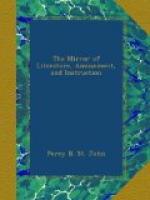The most remarkable circumstance is the visit paid to it on the 10th of May, 1777, by the Ex-King of France, the Count d’Artois (twenty years old). On inspecting the state-prison, a wooden cage was shown to him. The prince, struck with horror at the sight of it, ordered it to be destroyed. Shortly after, the young princes of Orleans, among whom the present King Philip, accompanied by Madame de Lillery, stopped at Mount St. Michael. After having inspected the subterraneous passages and magazines, the wooden cage was shown to them. They asked for workmen and axes, and giving the first blow themselves, this infernal machine was completely destroyed.
The prior of the abbey was formerly governor of the town and castle, and the keys were brought to him every evening. It gives name to the late military order of St. Michael, founded by Louis XI, in 1479. The view from the summit is fine, embracing the coasts of Normandy and Britanny, with the town and ruins of the cathedral of Avranches, elevated on a mountain, and the intervening valley, with the open sea of the British Channel.
W.G.C.
* * * * *
SONNET TO M * * *
(For the Mirror.)
Though rough, not lengthened, is our worldly
way;
Then wipe thy pearly eyes,
no more to weep—
Thy feet from falling let
this memory keep—
Our love hath lasted through the stormy
day.
These clouds like early mist shall melt
away,
And show the vale beyond the
pointed steep;
For they who sow in tears,
in smiles shall reap—
Then be thy spirits as the morning gay.
For thou alone art gifted with the power
To still the tempest in my
stubborn soul;
Thy smile creates around the
billows roll
The blissful quiet of a halcyon hour.
Then shed no tear—then heave
no sorrowing sigh
Since love like thine may time and toil
defy.
* * H.
* * * * *
LONG RIDES.
(To the Editor.)
In 478 of your entertaining little miscellany, I observe a short account of an unparalleled feat of riding, performed by John Lepton, of Reprich, in 1603. As I know you wish to be “quite correct,” the following may be acceptable: it is copied verbatim from a scarce book (in my possession) entitled, “The Abridgement of the English Chronicle,” by Edmund Howes, imprinted at London, 1668 (15th James I.):—
“In this month, John Lenton, of Kepwick, in the county of Yorke, Esq., a gentleman of an ancient family there, and of good reputation, his majesty’s servant, and one of the grooms of his most honourable privy chamber, performed so memorable a journey as I may not omit to record the same to future ages; the rather for that I did hear sundry gentlemen, who were good horsemen, and likewise many good physicians, affirm it was impossible to be done without danger of his life.




